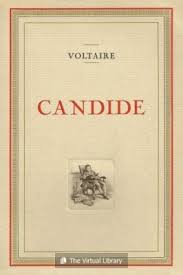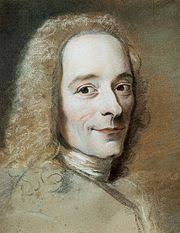Candide Page #12
Candide, ou l'Optimisme, is a French satire first published in 1759 by Voltaire, a philosopher of the Age of Enlightenment.
The Oreillons found this speech very reasonable. They deputed two of their principal people with all expedition to inquire into the truth of the matter; these executed their commission like men of sense, and soon returned with good news. The Oreillons untied their prisoners, showed them all sorts of civilities, offered them girls, gave them refreshment, and reconducted them to the confines of their territories, proclaiming with great joy: "He is no Jesuit! He is no Jesuit!" Candide could not help being surprised at the cause of his deliverance. "What people!" said he; "what men! what manners! If I had not been so lucky as to run Miss Cunegonde's brother through the body, I should have been devoured without redemption. But, after all, pure nature is good, since these people, instead of feasting upon my flesh, have shown me a thousand civilities, when then I was not a Jesuit." XVII ARRIVAL OF CANDIDE AND HIS VALET AT EL DORADO, AND WHAT THEY SAW THERE. "You see," said Cacambo to Candide, as soon as they had reached the frontiers of the Oreillons, "that this hemisphere is not better than the others, take my word for it; let us go back to Europe by the shortest way." "How go back?" said Candide, "and where shall we go? to my own country? The Bulgarians and the Abares are slaying all; to Portugal? there I shall be burnt; and if we abide here we are every moment in danger of being spitted. But how can I resolve to quit a part of the world where my dear Cunegonde resides?" "Let us turn towards Cayenne," said Cacambo, "there we shall find Frenchmen, who wander all over the world; they may assist us; God will perhaps have pity on us." It was not easy to get to Cayenne; they knew vaguely in which direction to go, but rivers, precipices, robbers, savages, obstructed them all the way. Their horses died of fatigue. Their provisions were consumed; they fed a whole month upon wild fruits, and found themselves at last near a little river bordered with cocoa trees, which sustained their lives and their hopes. Cacambo, who was as good a counsellor as the old woman, said to Candide: "We are able to hold out no longer; we have walked enough. I see an empty canoe near the river-side; let us fill it with cocoanuts, throw ourselves into it, and go with the current; a river always leads to some inhabited spot. If we do not find pleasant things we shall at least find new things." "With all my heart," said Candide, "let us recommend ourselves to Providence." They rowed a few leagues, between banks, in some places flowery, in others barren; in some parts smooth, in others rugged. The stream ever widened, and at length lost itself under an arch of frightful rocks which reached to the sky. The two travellers had the courage to commit themselves to the current. The river, suddenly contracting at this place, whirled them along with a dreadful noise and rapidity. At the end of four-and-twenty hours they saw daylight again, but their canoe was dashed to pieces against the rocks. For a league they had to creep from rock to rock, until at length they discovered an extensive plain, bounded by inaccessible mountains. The country was cultivated as much for pleasure as for necessity. On all sides the useful was also the beautiful. The roads were covered, or rather adorned, with carriages of a glittering form and substance, in which were men and women of surprising beauty, drawn by large red sheep which surpassed in fleetness the finest coursers of Andalusia, Tetuan, and Mequinez.[18] "Here, however, is a country," said Candide, "which is better than Westphalia." He stepped out with Cacambo towards the first village which he saw. Some children dressed in tattered brocades played at quoits on the outskirts. Our travellers from the other world amused themselves by looking on. The quoits were large round pieces, yellow, red, and green, which cast a singular lustre! The travellers picked a few of them off the ground; this was of gold, that of emeralds, the other of rubies--the least of them would have been the greatest ornament on the Mogul's throne. "Without doubt," said Cacambo, "these children must be the king's sons that are playing at quoits!" The village schoolmaster appeared at this moment and called them to school. "There," said Candide, "is the preceptor of the royal family." The little truants immediately quitted their game, leaving the quoits on the ground with all their other playthings. Candide gathered them up, ran to the master, and presented them to him in a most humble manner, giving him to understand by signs that their royal highnesses had forgotten their gold and jewels. The schoolmaster, smiling, flung them upon the ground; then, looking at Candide with a good deal of surprise, went about his business. The travellers, however, took care to gather up the gold, the rubies, and the emeralds. "Where are we?" cried Candide. "The king's children in this country must be well brought up, since they are taught to despise gold and precious stones." Cacambo was as much surprised as Candide. At length they drew near the first house in the village. It was built like an European palace. A crowd of people pressed about the door, and there were still more in the house. They heard most agreeable music, and were aware of a delicious odour of cooking. Cacambo went up to the door and heard they were talking Peruvian; it was his mother tongue, for it is well known that Cacambo was born in Tucuman, in a village where no other language was spoken. "I will be your interpreter here," said he to Candide; "let us go in, it is a public-house." Immediately two waiters and two girls, dressed in cloth of gold, and their hair tied up with ribbons, invited them to sit down to table with the landlord. They served four dishes of soup, each garnished with two young parrots; a boiled condor[19] which weighed two hundred pounds; two roasted monkeys, of excellent flavour; three hundred humming-birds in one dish, and six hundred fly-birds in another; exquisite ragouts; delicious pastries; the whole served up in dishes of a kind of rock-crystal. The waiters and girls poured out several liqueurs drawn from the sugar-cane. Most of the company were chapmen and waggoners, all extremely polite; they asked Cacambo a few questions with the greatest circumspection, and answered his in the most obliging manner. As soon as dinner was over, Cacambo believed as well as Candide that they might well pay their reckoning by laying down two of those large gold pieces which they had picked up. The landlord and landlady shouted with laughter and held their sides. When the fit was over: "Gentlemen," said the landlord, "it is plain you are strangers, and such guests we are not accustomed to see; pardon us therefore for laughing when you offered us the pebbles from our highroads in payment of your reckoning. You doubtless have not the money of the country; but it is not necessary to have any money at all to dine in this house. All hostelries established for the convenience of commerce are paid by the government. You have fared but very indifferently because this is a poor village; but everywhere else, you will be received as you deserve."
Translation
Translate and read this book in other languages:
Select another language:
- - Select -
- 简体中文 (Chinese - Simplified)
- 繁體中文 (Chinese - Traditional)
- Español (Spanish)
- Esperanto (Esperanto)
- 日本語 (Japanese)
- Português (Portuguese)
- Deutsch (German)
- العربية (Arabic)
- Français (French)
- Русский (Russian)
- ಕನ್ನಡ (Kannada)
- 한국어 (Korean)
- עברית (Hebrew)
- Gaeilge (Irish)
- Українська (Ukrainian)
- اردو (Urdu)
- Magyar (Hungarian)
- मानक हिन्दी (Hindi)
- Indonesia (Indonesian)
- Italiano (Italian)
- தமிழ் (Tamil)
- Türkçe (Turkish)
- తెలుగు (Telugu)
- ภาษาไทย (Thai)
- Tiếng Việt (Vietnamese)
- Čeština (Czech)
- Polski (Polish)
- Bahasa Indonesia (Indonesian)
- Românește (Romanian)
- Nederlands (Dutch)
- Ελληνικά (Greek)
- Latinum (Latin)
- Svenska (Swedish)
- Dansk (Danish)
- Suomi (Finnish)
- فارسی (Persian)
- ייִדיש (Yiddish)
- հայերեն (Armenian)
- Norsk (Norwegian)
- English (English)
Citation
Use the citation below to add this book to your bibliography:
Style:MLAChicagoAPA
"Candide Books." Literature.com. STANDS4 LLC, 2025. Web. 22 Jan. 2025. <https://www.literature.com/book/candide_25>.




Discuss this Candide book with the community:
Report Comment
We're doing our best to make sure our content is useful, accurate and safe.
If by any chance you spot an inappropriate comment while navigating through our website please use this form to let us know, and we'll take care of it shortly.
Attachment
You need to be logged in to favorite.
Log In